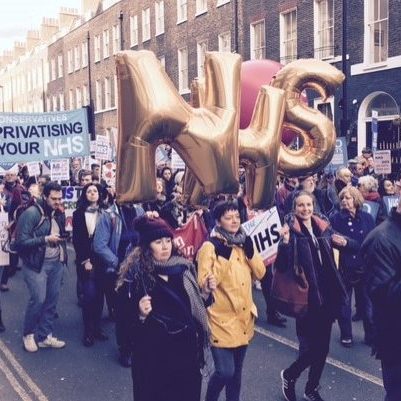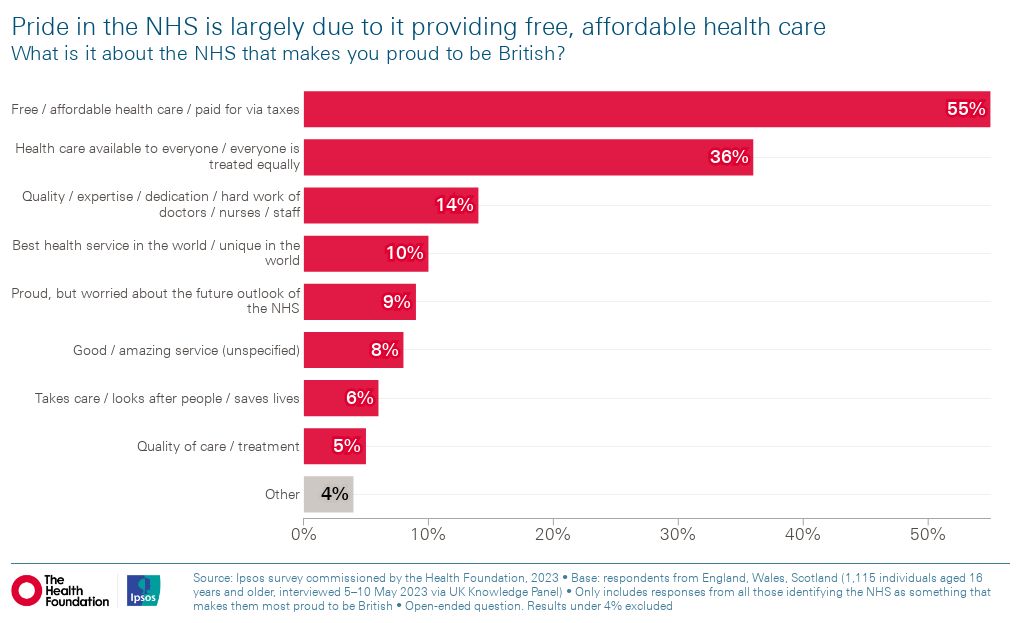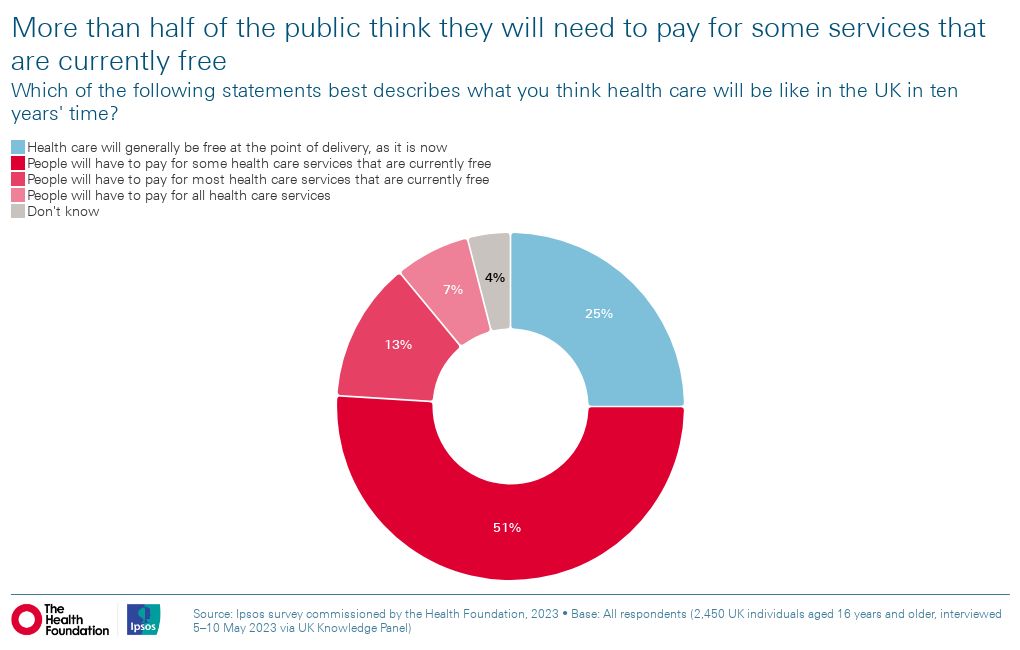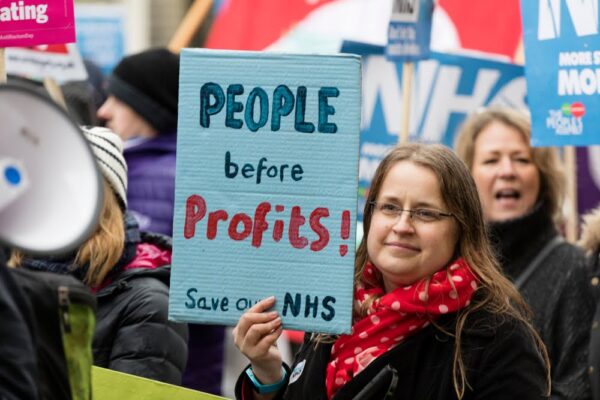
Despite numerous opinion polls and surveys across the decades since 1948, the public view remains that the NHS should continue to be tax-funded and free at the point of use.
However, from 2010 public satisfaction with the NHS has declined, falling to 29% by the end of 2022 - the lowest level since the survey began in 1983. This trend ran alongside a decade-long funding squeeze and a range of policies to increase the outsourcing of NHS care, since then a poll of the public in 2022 found that 66% were concerned about the impact NHS outsourcing.
On this page
The NHS should be free of charge when needed?
The NHS should be funded by taxes?
Will pay for NHS services in 10 years time?
Overall findings
The overall consensus across public opinion is that the NHS should remain a tax-funded public service that is free at the point of use and that the NHS should be the priority for any extra government funding. Public opinion over many years has been gathered via polling such as the British Social Attitudes (BSA) survey conducted each year since the early 1980s, six monthly surveys conducted by the Health Foundation and a tracker poll run by YouGov. Added to the findings from these have been results from ad hoc surveys conducted by various organisations.
The 2022 BSA survey found a large majority of respondents agreed that the founding principles of the NHS should ‘definitely’ or ‘probably’ apply: that the NHS should be free of charge when you need it (93%), the NHS should primarily be funded through taxes (82%) and the NHS should be available to everyone (84%).
A Health Foundation poll taken in May 2023 found almost three-quarters of the public still think the NHS is crucial to British society and we must try to maintain it. A majority of the public (72%) believe, ‘The NHS is crucial to British society and we must do everything to maintain it’, although this is 5 percentage points lower than a year ago.
The poll also found that the NHS makes more people proud to be British than our history, our culture, our system of democracy or the royal family. With over half (54%) saying the NHS makes them most proud to be British. Pride in the NHS is largely due to it providing free/affordable health care paid for via taxes.

The Health Foundation polling in mid-2023, however, found the public concerned that the services being free to all and at the point of use is being gradually eroded. The majority (80%) continue to think that the NHS needs an increase in funding and the public generally favours paying for this through tax rises.
Backing for NHS funding has remained consistently strong whilst support for other welfare spending has dwindled in recent decades.
Ipsos conducted a series of deliberative discussion events with the King's Fund on NHS funding in 2018. When asked about how well they thought that the NHS spent its money, 50% responded that they felt the NHS often wasted money. Notably, examples given on what this money was wasted on included; private finance initiatives; procurement processes; and spending on private hospitals for procedures on NHS patients.
It is not only the general public that are worried about the privatisation of the NHS. Back in 2013 YouGov conducted a survey of NHS Professionals regarding the 2012 reforms to the health service from the Health and Social Care Act. 31% of respondents felt that the main intention of government reforms was to increase privatisation in the health service. Additionally, 31% also believed that increased privatisation had been one of the main impacts of these reforms.
When YouGov investigated what the public thought about who should run a variety of public services. 84% of respondents stated that the NHS should be run in the public sector.
In early 2023, research by Survation for campaign group We Own It found that 66% of people are concerned about outsourcing the health service to private companies and want the NHS to be reinstated as a fully public service.
In November 2021 a poll commissioned by openDemocracy run by SavantaComRes found that around three-quarters of UK adults would be concerned if the proportion of healthcare provided by the NHS using private companies were to increase. The poll found that 76% were also concerned by the general principle of healthcare being run for profit in the UK, with half (50%) saying they were “very concerned” about this.
Three-quarters of those polled specifically fear that an increase in the use of private companies by the NHS would result in corners being cut (76%), the use of less-skilled staff (74%), and healthcare systems becoming more disjointed or fragmented (77%).
These polls suggest that the public are genuinely worried about the current state of the NHS. Multiple surveys point to the fact that much of the public would be willing to pay more tax to the NHS and that the health service should be a major target for investment. Not only this, but the overwhelming majority of people believe it should remain a public service and some of the main wastes of money are spending on private initiatives.
How has opinion changed?
The King's Fund using data from the British Social Attitudes (BSA) survey has analysed how public attitudes to the NHS have changed over the last four decades since surveys began in the 1980s. Each year the survey asks people what it's like to live in Britain and what they think about how Britain is run, including measuring levels of public satisfaction with the health and care services. Health has remained the public's number one priority for any extra government spending. This is despite significant differences over these periods in the level of NHS investment from the government.
The public has also consistently been asked whether taxes should be raised, kept the same or lowered to pay for health, education and social benefits. The idea of lowering taxes has been continuously rejected by a huge majority of the public. Support for increase in taxes between 1983 and 1991 doubled to 65% but then fell back to 32% in 2010. However, public support for an increase began to grow again for the first time in a decade.
More recent data from the 2022 survey found that, 83% of respondents believed that the NHS had a major or severe funding problem. And in total 43% of people chose one of the two options that involved paying more taxes. But for the first time since 2015, the most popular single option when asked how more money should be raised for the NHS was that ‘the NHS needs to live within its own budget’ (chosen by 28% of respondents).
However, the Health Foundation poll tracking public perceptions of the NHS taken every six months found in May 2023 that most people (80%) continue to think that the NHS needs an increase in funding, compared with just 17% who think that the NHS should operate within its current budget. But the public remains split on how the government should fund any further increases in spending. The most popular options are an additional tax earmarked specifically for the NHS (31%), an increase in National Insurance (22%) and an increase in Income Tax (21%).
A YouGov tracker poll has found that since June 2019 public opinion has altered little when asked the simple question "thinking about how NHS healthcare is PROVIDED, which of the following best reflects your view?" - with around 30% thinking no NHS service should be provided by a private company, around 55% saying the NHS should be allowed to use a private company if it can provide the service at NHS prices, and only just under 10% saying all NHS services should be privatised.
What do people think for the future?
Protecting the core values of the NHS, to remain free at the point of use and maintaining quality care for all is a value seemingly shared by a majority of the public through the results of multiple opinion polls and surveys. In 2023, the 75th anniversary of the NHS, polling clearly showed the public wanting a better health service not a different health system. However, the public are concerned that it will not remain free at the point of use.
The Health Foundation polling in May 2023 found only 25% of the public believed health care will still be largely free at point of delivery in 10 years’ time. Half (51%) expect to pay for some services currently free at point of use, while 13% think most services will need to be paid for upfront and 7% anticipate user charges for all services.

Overall, people are not confident the NHS is equipped for the major challenges it will face in the coming years.
This worry for the future is something that is felt by large swathes of the population. It makes the discussion surrounding NHS funding and privatisation even more important with so many people caring about it and relying on it. It is clear there is a strong public appetite to engage in a conversation about protecting the NHS, not replacing it and in helping it adapt to a changing society.








